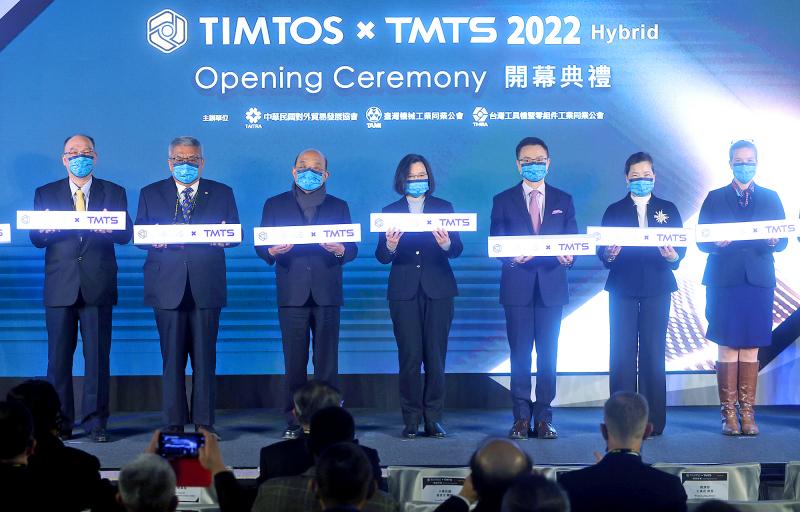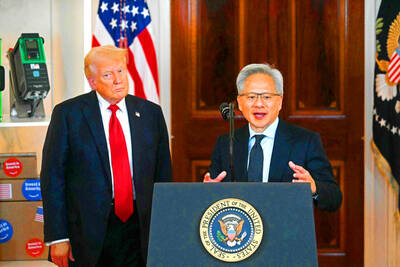The machine tool industry is one of the domestic sectors that would overcome tariff and trade barriers if Taiwan joins the Comprehensive and Progressive Agreement for Trans-Pacific Partnership (CPTPP), President Tsai Ing-wen (蔡英文) said yesterday.
Speaking at the opening of a machine tool trade show in Taipei, Tsai said the industry has a self-sustaining supply chain and is one of the main drivers of the nation’s economic growth.
The sector comprises mainly small and medium-sized enterprises that have a great spirit of innovation and have achieved major breakthroughs, Tsai said at the joint Taipei International Machine Tool Show and the Taiwan International Machine Tool Show.

Photo: CNA
In 2020, the machinery and machine tools industry was part of a national team that was assembled to quickly boost Taiwan’s mask production capacity during a shortage due to the COVID-19 pandemic, she said.
Last year, the output value of Taiwan’s machinery sector climbed to NT$1.3 trillion (US$46.71 billion), and its exports have been growing steadily over the past 17 months, she said, adding that the industry provides more than 300,000 jobs.
Noting that several of the CPTPP’s 11 members buy Taiwan-made machinery and machine tools, Tsai said her administration would do its utmost to seek Taiwan’s admission to the Asia-Pacific trade bloc that represents 495 million consumers and 13.5 percent of the global economy.
The machinery and machine tools industry, as well as other domestic sectors, would benefit from Taiwan’s accession to the bloc, as they are well-positioned to overcome tariff and trade barriers, which boosts their international competitiveness, Tsai said.
Taiwan should be moving in the direction of developing smart manufacturing solutions to cope with geopolitical changes and achieve its goal of becoming a carbon neutral country by 2050, she added.
To that end, Taiwan should assemble a national team that incorporates information and communication technology, smart manufacturing technology, and the machinery industries, Tsai said.
The government would help domestic industries explore new opportunities, she said, pointing to possibilities existing as a result of Vietnam, Malaysia and Indonesia’s aggressive development of the Internet of Things and artificial intelligence applications.
Taiwan Association of Machinery Industry chairman Larry Wei (魏燦文) told the opening ceremony that US$1.2 billion to US$1.7 billion of purchase orders are expected during the six-day event.
The trade show is being held at the Taipei Nangang Exhibition Center’s Hall 1 and 2, where 950 exhibitors rented 5,100 booths, while more than 1,000 international buyers from 62 countries have registered for online procurement sessions.
The physical show ends on Saturday, while the online version is to run through March 21.
The output value of Taiwan’s machine tools is expected to reach NT$108.2 billion this year and the machinery industry is aiming for an annual output of NT$2 trillion in the future, Wei said.
The industry’s output last year reached NT$1.3 trillion, while its exports grew by 27 percent annually to a record US$33.14 billion. Exports of machine tools alone totaled US$2.78 billion, up 29.1 percent from a year earlier, and they are expected to surpass US$3 billion this year.
The nation’s major machinery exports include machine tools, power transmission equipment and key components for machinery equipment, including ball screws and linear guides.

Taiwan Semiconductor Manufacturing Co (TSMC, 台積電) last week recorded an increase in the number of shareholders to the highest in almost eight months, despite its share price falling 3.38 percent from the previous week, Taiwan Stock Exchange data released on Saturday showed. As of Friday, TSMC had 1.88 million shareholders, the most since the week of April 25 and an increase of 31,870 from the previous week, the data showed. The number of shareholders jumped despite a drop of NT$50 (US$1.59), or 3.38 percent, in TSMC’s share price from a week earlier to NT$1,430, as investors took profits from their earlier gains

AI TALENT: No financial details were released about the deal, in which top Groq executives, including its CEO, would join Nvidia to help advance the technology Nvidia Corp has agreed to a licensing deal with artificial intelligence (AI) start-up Groq, furthering its investments in companies connected to the AI boom and gaining the right to add a new type of technology to its products. The world’s largest publicly traded company has paid for the right to use Groq’s technology and is to integrate its chip design into future products. Some of the start-up’s executives are leaving to join Nvidia to help with that effort, the companies said. Groq would continue as an independent company with a new chief executive, it said on Wednesday in a post on its Web

CHINA RIVAL: The chips are positioned to compete with Nvidia’s Hopper and Blackwell products and would enable clusters connecting more than 100,000 chips Moore Threads Technology Co (摩爾線程) introduced a new generation of chips aimed at reducing artificial intelligence (AI) developers’ dependence on Nvidia Corp’s hardware, just weeks after pulling off one of the most successful Chinese initial public offerings (IPOs) in years. “These products will significantly enhance world-class computing speed and capabilities that all developers aspire to,” Moore Threads CEO Zhang Jianzhong (張建中), a former Nvidia executive, said on Saturday at a company event in Beijing. “We hope they can meet the needs of more developers in China so that you no longer need to wait for advanced foreign products.” Chinese chipmakers are in

POLICY REVERSAL: The decision to allow sales of Nvidia’s H200 chips to China came after years of tightening controls and has drawn objections among some Republicans US House Republicans are calling for arms-sale-style congressional oversight of artificial intelligence (AI) chip exports as US President Donald Trump’s administration moves to approve licenses for Nvidia Corp to ship its H200 processor to China. US Representative Brian Mast, the Republican chairman of the US House Committee on Foreign Affairs, which oversees export controls, on Friday introduced a bill dubbed the AI Overwatch Act that would require the US Congress to be notified of AI chips sales to adversaries. Any processors equal to or higher in capabilities than Nvidia’s H20 would be subject to oversight, the draft bill says. Lawmakers would have